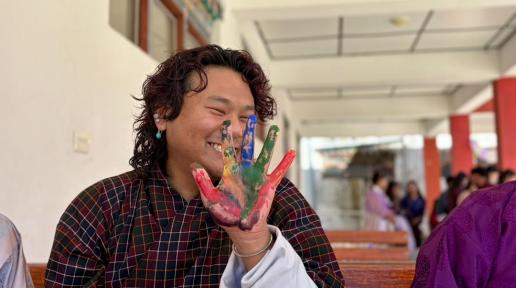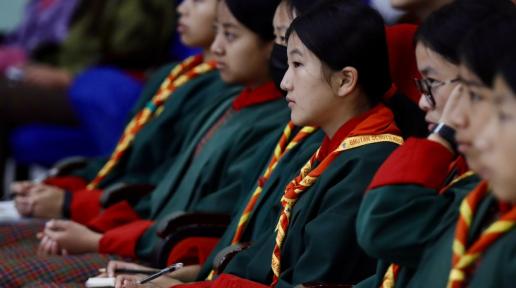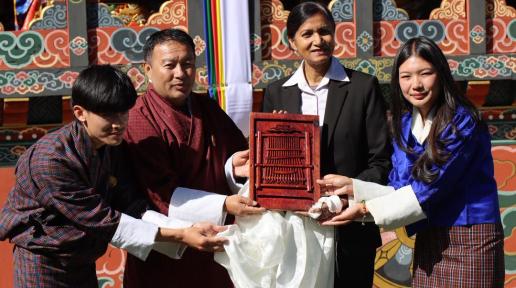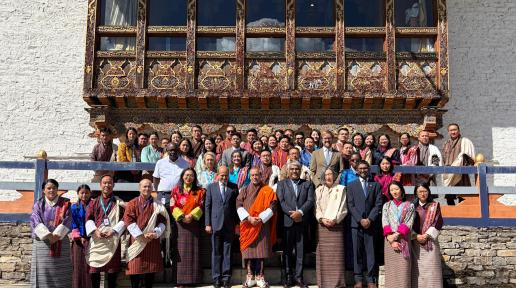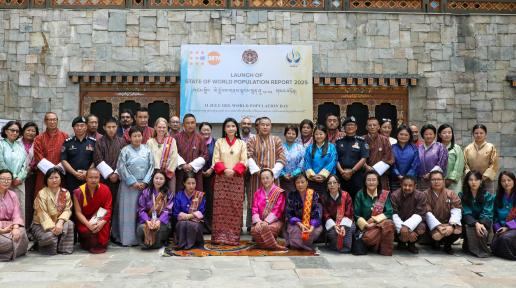Story
12 December 2025
Bhutan SDG Impact Finance Forum opens door to a new chapter in sustainable development financing
As Bhutan enters a new phase of global engagement following its graduation from Least Developed Country (LDC) status, a quiet but transformative two-day forum created a platform to reimagine how development is financed, who it serves, and what it ultimately values.That shift took centre stage at the Bhutan SDG Impact Finance Forum, held on 11–12 December 2025 in Thimphu. Opened by the Honourable Prime Minister of Bhutan, Lyonchen Tshering Tobgay, and organised by the United Nations in Bhutan, the Forum brought together policymakers, global impact investors, philanthropies, development partners, financial institutions, entrepreneurs and innovators to explore new pathways for sustainable and inclusive growth. The Forum served as both a reflection of Bhutan’s evolving development landscape and a practical platform to explore how impact finance, blended finance and innovative partnerships can support the country’s long-term vision.A Pivotal Moment in Bhutan’s Development JourneyBhutan’s graduation from LDC status in 2023 marked the beginning of a new chapter, one that demands fresh thinking and new approaches to financing development. Traditional sources of concessional finance, while still important, are no longer sufficient on their own to meet the scale of Bhutan’s ambitions under its Vision 2050, the 13th Five Year Plan, and the 2030 Agenda for Sustainable Development.
Opening the Forum, the Prime Minister, Lyonchen Dasho Tshering Tobgay, emphasized that Bhutan stands at a decisive moment as it shapes its development path beyond LDC status. He highlighted the importance of strengthening small and medium enterprises and empowering young entrepreneurs, noting the Pelsung movement as a critical foundation for building a more resilient, future-ready economy.
“Traditional financing alone is no longer sufficient,” the Prime Minister said, calling for bold and innovative partnerships that bring together government, global institutions, philanthropies and youth. He encouraged participants to engage deeply with Bhutan’s SDG investment pipeline, exchange insights and build collaborations that can drive progress in Bhutan and beyond. The Kuensel editorial, “Impact Finance Forum: A Promising Start,” highlighted this reality, observing that while the Forum will not solve Bhutan’s financing challenges overnight, it represents an important first step in broadening the national conversation on how development is funded. The editorial highlighted the importance of building local understanding and capacity so that impact finance can be applied meaningfully and responsibly within Bhutan’s unique context.
Participants at the Forum echoed this sentiment, acknowledging that although debt and equity financing are becoming more familiar to Bhutanese enterprises, approaches such as impact investing, catalytic capital, noble capital, patient capital and blended finance remain less widely understood. The Forum was designed precisely to address this gap by expanding awareness while ensuring that Bhutan’s development priorities and values remain central.Beyond Traditional Development FinanceAcross the two days of dialogue, one message surfaced repeatedly: financing Bhutan’s development is not only about mobilizing more capital, but about ensuring the country is fully prepared to use it well. Readiness of policies, institutions, project pipelines and partnerships emerged as being just as critical as access to finance itself.Discussions moved beyond conventional funding models to explore how impact investment, patient and catalytic capital, philanthropic partnerships and blended finance can unlock new possibilities across Bhutan’s economy. These approaches offer practical pathways to support small and medium enterprises, empower youth- and women-led ventures, strengthen climate-resilient businesses and scale community-driven solutions, while remaining firmly aligned with Bhutan’s development values. Participants also reflected on the limits of traditional development finance in addressing today’s interconnected challenges. In a context marked by global economic uncertainty and climate risks, public finance alone cannot close the widening SDG and climate financing gaps. Innovative financing models and cross-sector partnerships were therefore seen not as alternatives, but as essential complements, helping to translate ambition into action and ensuring that Bhutan’s national priorities are matched with long-term, responsible capital.Together, these conversations reinforced a shared understanding: impact finance is not a future aspiration, but a necessary tool to advance Bhutan’s 13th Five Year Plan, the 21st Century Economic Roadmap and the 2030 Agenda for Sustainable Development.Finance Rooted in Bhutanese ValuesDiscussions throughout the Forum were firmly grounded in Bhutan’s philosophy of Gross National Happiness, environmental stewardship and cultural preservation. The speakers repeatedly emphasized that Bhutan’s greatest strength lies in its ability to align economic ambition with ethical and environmental responsibility.Additionally, the Forum reaffirmed Bhutan’s belief that finance should work in service of people and communities, and that sustainable development must be pursued without compromising cultural identity or environmental integrity. This value-based approach, resonated strongly with global investors seeking authentic and purpose-driven partnerships.From Dialogue to DeliveryThe Forum was designed as a do-fest, not a talk-fest, and placed strong emphasis on practical engagement. Entrepreneurs and innovators participated in pitching and reverse-pitching sessions, while technical case studies demonstrated how global impact finance tools can be adapted to Bhutan’s context.During the Forum, entrepreneurs showcased solutions across agriculture, climate resilience, social enterprise, education and technology, reflecting a growing pipeline of impact-driven ventures. Investors, in turn, explored how patient capital and blended finance can support long-term growth while delivering measurable social and environmental outcomes. A shared ambition emerged: to position Bhutan as a leader in impact finance, where policy, partnerships, technology and entrepreneurship work together to mobilize capital at scale, while remaining deeply rooted in national values and community needs.Commitments That Signal MomentumSeveral commitments focused on direct support to Bhutanese entrepreneurs. In addition to a grant for the Loden Tewa accelerator and catalytic fund, Abbie Jung and Jana Svedova of Synergy Social Ventures committed to provide ongoing advisory support for both Loden Tewa and its portfolio companies, including brainstorming, business model development, fundraising strategies, and facilitating connections. Insitor Partners pledged to support organizations in Bhutan with training and mentorship to enhance the entrepreneurial and management capacities of local businesses. In a significant step toward impact venture building, Loden Tewa and the Nordic Impact Investing Network (NIIN) will collaborate on entrepreneur acceleration, investments, and ecosystem building.Building an Enabling EcosystemThe Kuensel editorial cautioned that sustained effort will be required to translate interest into long-term impact, noting that regulatory readiness, financial literacy and ecosystem coordination will be critical next steps. At the same time, it acknowledged the Forum as a promising foundation for future progress.More than a financing event, the Bhutan SDG Impact Finance Forum marked a shift toward long-term, trust-based partnerships, strengthening the knowledge, networks and confidence of Bhutanese entrepreneurs to engage with new forms of finance.As highlighted by UN Bhutan, the Forum represents a practical step toward building an enabling ecosystem where enterprises can access diverse sources of capital without compromising Bhutan’s commitments to the Sustainable Development Goals. Discussions also highlighted the strong alignment between Bhutan’s national priorities and ongoing global efforts to reform the international financial architecture. Participants reflected on how global commitments, from the Summit of the Future to recent international conferences on financing for development and landlocked developing countries, can be translated into practical opportunities for Bhutan.A Values-Driven Vision for the FutureAs Bhutan looks ahead, the Forum demonstrated that impact finance, when aligned with national values and community priorities, can become a powerful catalyst for inclusive growth, climate resilience and shared prosperity.Closing the Forum, the UN Resident Coordinator a.i. Rushnan Murtaza echoed this confidence, noting that over the two days, Bhutan demonstrated it is not only investment-ready, but also investment-worthy.“Impact finance is not a luxury, it is crucial to Bhutan’s development priorities,” said Rushnan Murtaza. “Guided by Vision 2050 and rooted in Gross National Happiness, Bhutan is uniquely positioned to show how finance can serve people, planet and prosperity together.”She highlighted that the Forum strengthened investor confidence in Bhutan’s SDG-aligned ventures, clarified pathways for blended and catalytic finance, amplified Bhutan’s global leadership in values-based development, and, most importantly, generated a collective commitment to continue engagement beyond the Forum. The Minister for Industry, Commerce and Employment, Lyonpo Namgyal Dorji highlighted that Bhutan’s ambitions to grow its economy while safeguarding its environment, culture and identity are bold, but achievable with the right partnerships and financing approaches.“Bhutan may be small in size, but our ambition for impact is large, and the global impact finance community is ready to walk this journey with us,” said Lyonpo Namgyal Dorji.As the Forum closed, participants were invited to carry forward the momentum, translating conversations into partnerships, and partnerships into tangible development results. An invitation was extended for the Bhutan Investment Summit/Forum in February 2026, as the next step in deepening collaboration by the Minister.
Opening the Forum, the Prime Minister, Lyonchen Dasho Tshering Tobgay, emphasized that Bhutan stands at a decisive moment as it shapes its development path beyond LDC status. He highlighted the importance of strengthening small and medium enterprises and empowering young entrepreneurs, noting the Pelsung movement as a critical foundation for building a more resilient, future-ready economy.
“Traditional financing alone is no longer sufficient,” the Prime Minister said, calling for bold and innovative partnerships that bring together government, global institutions, philanthropies and youth. He encouraged participants to engage deeply with Bhutan’s SDG investment pipeline, exchange insights and build collaborations that can drive progress in Bhutan and beyond. The Kuensel editorial, “Impact Finance Forum: A Promising Start,” highlighted this reality, observing that while the Forum will not solve Bhutan’s financing challenges overnight, it represents an important first step in broadening the national conversation on how development is funded. The editorial highlighted the importance of building local understanding and capacity so that impact finance can be applied meaningfully and responsibly within Bhutan’s unique context.
Participants at the Forum echoed this sentiment, acknowledging that although debt and equity financing are becoming more familiar to Bhutanese enterprises, approaches such as impact investing, catalytic capital, noble capital, patient capital and blended finance remain less widely understood. The Forum was designed precisely to address this gap by expanding awareness while ensuring that Bhutan’s development priorities and values remain central.Beyond Traditional Development FinanceAcross the two days of dialogue, one message surfaced repeatedly: financing Bhutan’s development is not only about mobilizing more capital, but about ensuring the country is fully prepared to use it well. Readiness of policies, institutions, project pipelines and partnerships emerged as being just as critical as access to finance itself.Discussions moved beyond conventional funding models to explore how impact investment, patient and catalytic capital, philanthropic partnerships and blended finance can unlock new possibilities across Bhutan’s economy. These approaches offer practical pathways to support small and medium enterprises, empower youth- and women-led ventures, strengthen climate-resilient businesses and scale community-driven solutions, while remaining firmly aligned with Bhutan’s development values. Participants also reflected on the limits of traditional development finance in addressing today’s interconnected challenges. In a context marked by global economic uncertainty and climate risks, public finance alone cannot close the widening SDG and climate financing gaps. Innovative financing models and cross-sector partnerships were therefore seen not as alternatives, but as essential complements, helping to translate ambition into action and ensuring that Bhutan’s national priorities are matched with long-term, responsible capital.Together, these conversations reinforced a shared understanding: impact finance is not a future aspiration, but a necessary tool to advance Bhutan’s 13th Five Year Plan, the 21st Century Economic Roadmap and the 2030 Agenda for Sustainable Development.Finance Rooted in Bhutanese ValuesDiscussions throughout the Forum were firmly grounded in Bhutan’s philosophy of Gross National Happiness, environmental stewardship and cultural preservation. The speakers repeatedly emphasized that Bhutan’s greatest strength lies in its ability to align economic ambition with ethical and environmental responsibility.Additionally, the Forum reaffirmed Bhutan’s belief that finance should work in service of people and communities, and that sustainable development must be pursued without compromising cultural identity or environmental integrity. This value-based approach, resonated strongly with global investors seeking authentic and purpose-driven partnerships.From Dialogue to DeliveryThe Forum was designed as a do-fest, not a talk-fest, and placed strong emphasis on practical engagement. Entrepreneurs and innovators participated in pitching and reverse-pitching sessions, while technical case studies demonstrated how global impact finance tools can be adapted to Bhutan’s context.During the Forum, entrepreneurs showcased solutions across agriculture, climate resilience, social enterprise, education and technology, reflecting a growing pipeline of impact-driven ventures. Investors, in turn, explored how patient capital and blended finance can support long-term growth while delivering measurable social and environmental outcomes. A shared ambition emerged: to position Bhutan as a leader in impact finance, where policy, partnerships, technology and entrepreneurship work together to mobilize capital at scale, while remaining deeply rooted in national values and community needs.Commitments That Signal MomentumSeveral commitments focused on direct support to Bhutanese entrepreneurs. In addition to a grant for the Loden Tewa accelerator and catalytic fund, Abbie Jung and Jana Svedova of Synergy Social Ventures committed to provide ongoing advisory support for both Loden Tewa and its portfolio companies, including brainstorming, business model development, fundraising strategies, and facilitating connections. Insitor Partners pledged to support organizations in Bhutan with training and mentorship to enhance the entrepreneurial and management capacities of local businesses. In a significant step toward impact venture building, Loden Tewa and the Nordic Impact Investing Network (NIIN) will collaborate on entrepreneur acceleration, investments, and ecosystem building.Building an Enabling EcosystemThe Kuensel editorial cautioned that sustained effort will be required to translate interest into long-term impact, noting that regulatory readiness, financial literacy and ecosystem coordination will be critical next steps. At the same time, it acknowledged the Forum as a promising foundation for future progress.More than a financing event, the Bhutan SDG Impact Finance Forum marked a shift toward long-term, trust-based partnerships, strengthening the knowledge, networks and confidence of Bhutanese entrepreneurs to engage with new forms of finance.As highlighted by UN Bhutan, the Forum represents a practical step toward building an enabling ecosystem where enterprises can access diverse sources of capital without compromising Bhutan’s commitments to the Sustainable Development Goals. Discussions also highlighted the strong alignment between Bhutan’s national priorities and ongoing global efforts to reform the international financial architecture. Participants reflected on how global commitments, from the Summit of the Future to recent international conferences on financing for development and landlocked developing countries, can be translated into practical opportunities for Bhutan.A Values-Driven Vision for the FutureAs Bhutan looks ahead, the Forum demonstrated that impact finance, when aligned with national values and community priorities, can become a powerful catalyst for inclusive growth, climate resilience and shared prosperity.Closing the Forum, the UN Resident Coordinator a.i. Rushnan Murtaza echoed this confidence, noting that over the two days, Bhutan demonstrated it is not only investment-ready, but also investment-worthy.“Impact finance is not a luxury, it is crucial to Bhutan’s development priorities,” said Rushnan Murtaza. “Guided by Vision 2050 and rooted in Gross National Happiness, Bhutan is uniquely positioned to show how finance can serve people, planet and prosperity together.”She highlighted that the Forum strengthened investor confidence in Bhutan’s SDG-aligned ventures, clarified pathways for blended and catalytic finance, amplified Bhutan’s global leadership in values-based development, and, most importantly, generated a collective commitment to continue engagement beyond the Forum. The Minister for Industry, Commerce and Employment, Lyonpo Namgyal Dorji highlighted that Bhutan’s ambitions to grow its economy while safeguarding its environment, culture and identity are bold, but achievable with the right partnerships and financing approaches.“Bhutan may be small in size, but our ambition for impact is large, and the global impact finance community is ready to walk this journey with us,” said Lyonpo Namgyal Dorji.As the Forum closed, participants were invited to carry forward the momentum, translating conversations into partnerships, and partnerships into tangible development results. An invitation was extended for the Bhutan Investment Summit/Forum in February 2026, as the next step in deepening collaboration by the Minister.




